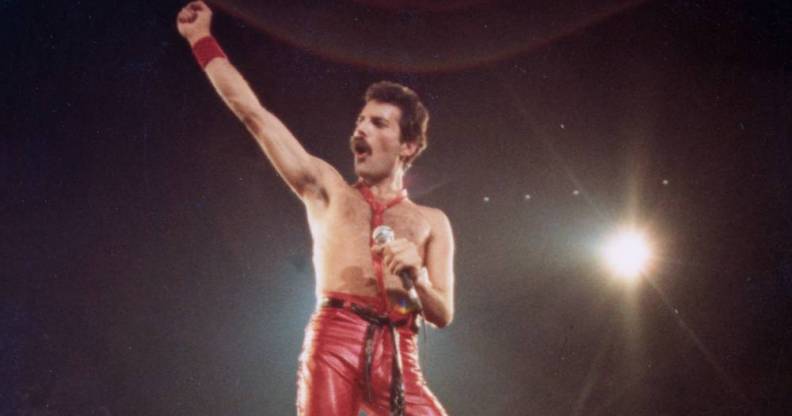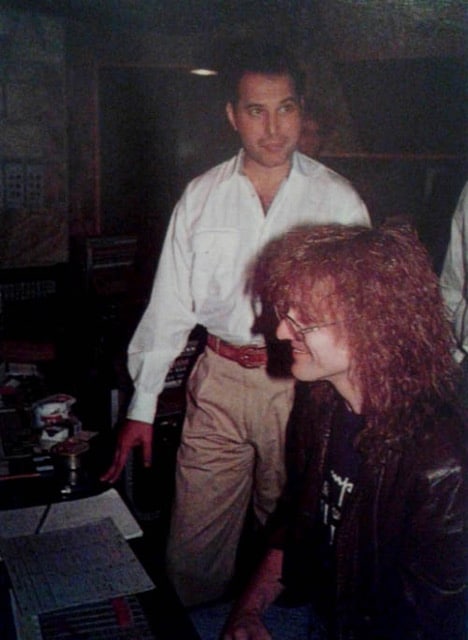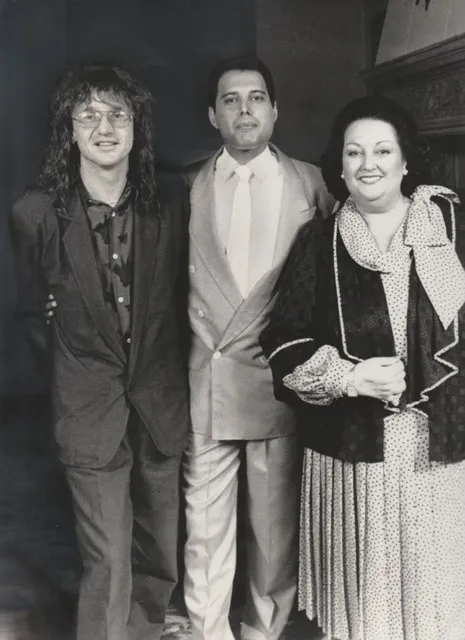Freddie Mercury remembered as ‘kind, generous and loving’ 30 years on from his tragic death

Lead singer of Queen, Freddie Mercury, performs onstage during The Game Tour at Joe Louis Arena, 20 September 1980, in Detroit, Michigan. (Ross Marin/Getty)
Mike Moran still remembers the last time he saw Freddie Mercury before his death.
It was the Queen frontman’s birthday party – he was turning 45 – and Mike, a music producer and longtime friend of Freddie’s, was invited.
“We went to the party and Fred was just Fred,” Mike tells PinkNews. “He got a little tired – well, he got very tired, actually – and it was an early night, if you like. I can’t say it was a joyful experience, but it was a comforting experience because he was actually just glad to see everybody. It was just a little hint of normality in this progressively awful illness.
“We had a lovely dinner, we had a lovely chat. There were about 12 of us there. I remember getting into a taxi outside Garden Lodge (Freddie’s home) and when the door closed, that was the first time I thought: ‘That’s Fred saying goodbye.’ The chances were that that was the last time we would ever see him, and that was indeed the case. It wasn’t that long afterwards that he died.”
Wednesday 24 November marks 30 years since Freddie Mercury tragically passed away. He was just 45-years-old, and he died just 24 hours after revealing to the world that he had AIDS.
Mike is just one of Freddie’s many loved ones who appears in a new BBC 2 documentary Freddie Mercury: The Final Act. The documentary tells the story of the final years of Freddie’s life, leading right up to his death. It also charts the trajectory of the AIDS epidemic and illustrates in tragic fashion that Freddie’s death was sadly not unique.
Still, Mike has his memories of Freddie, who he describes as “kind, generous and loving”. The pair first met when Mike was working on a show called Time on the West End, which Freddie recorded songs for. They quickly developed a close friendship, and Mike worked extensively on Freddie’s 1988 album Barcelona, which he recorded with Montserrat Caballé.
Freddie Mercury was ‘kind, generous and loving’ with a ‘fantastic sense of humour’
“He was a force of nature,” Mike says when asked how he would describe Freddie. “He was, as always is the case with people with a high public profile, there are two sides – hence we did ‘The Great Pretender’. On stage, he was one of the most iconic figures of the 20th century in UK popular music. As a writer, performer, you name it – he had it.
“Privately, he was an extremely kind, generous, loving person with a fantastic sense of humour. We were in hysterics most of the time. We had great fun, and his home, although it was stuffed full of wonderful pieces of art and precious things, it was a home, and it was treated like a home. All the normal homely things went on there. A great evening for us when we weren’t working was to play Scrabble or Trivial Pursuit – it was like a war zone when you played those games with Freddie by the way. The competition was intense.”
Freddie had “enough money to indulge in a lot of things he liked”, Mike says, and he remembers the singer’s home on Logan Place in Kensington being stuffed full of priceless paintings. Mike distinctly recalls bringing his wife and then three year old daughter over to Freddie’s house once – his wife was terrified their child would break something, but Freddie didn’t seem to care.
“Freddie said, ‘Calm down, it’s fine, she won’t damage anything, and if she does, we’ll replace it!’ Mike laughs. “We were a very close bunch of people really, and the delight was the entertainment at Logan Place. There was fantastic food and lots of fun – just very happy memories. Christmas was a joy – the decoration of the tree was an event that should have been filmed and put on a stage show, it was hysterical. He loved giving gifts, and it was a joyful experience.”
Besides being a loving and dedicated friend, Freddie was also a hard worker who was fiercely committed to giving his absolute best to his craft at all times. The studio was “a very professional environment”, Mike says, and Freddie was always the first in and the last out in the evening.
“We would work solidly, we didn’t even go out for a meal in the middle – we brought a fantastic selection of goodies from Garden Lodge and would chomp through those if we were hungry. Basically, it was work, work, work with Freddie. He was very adventurous in the studio, and as we know, he took a lot of risks. He was very brave in terms of what he put out to the public. As long as it satisfied his artistic values, then he thought, well it should go out.”
We knew he wasn’t well, but there was this feeling of, ‘Oh, well it’s Fred. He’ll beat it, whatever it is.’
Mike remembers making Barcelona with Freddie in the late 1980s. There was “no template” for such a project, he says, so he was surprised when Freddie decided he wanted to release the title track as its lead single.
“I said, ‘Are you sure Fred?’ I didn’t really ever think it would be a single, it was just a different kind of music. Nothing had been done quite like that before. And he said to me, ‘Don’t you like it?’ And I said, ‘Well of course I do! It’s fabulous.’ And he said, ‘Well we’ll put it out.’”
The dream couldn’t last forever, sadly. Towards the end of the 1980s, those in Freddie’s close circle started to realise that something wasn’t right. Looking back, Mike says he and other friends were in denial.
“We knew he wasn’t well, but there was this feeling of, ‘Oh, well it’s Fred. He’ll beat it, whatever it is.’ It was never really discussed that much. We all know people who have had some horrible illness, whether it’s cancer or whatever, but I think people who unfortunately suffer from these things a lot of the time don’t want to be viewed as, ‘Oh, it’s good considering they’ve got cancer,’ or something like that. You want to be seen as someone that’s not categorised by that particular illness, so in Fred’s case, it was, let’s get on with it.”
Freddie’s ill-health wasn’t up for discussion – even among friends
Because of Freddie’s attitude, his condition became something friends didn’t bring up, Mike says. “He would say, ‘I’m very tired, I have to go to the doctor,’ but there was never really that conversation behind his back of, ‘Oh my God, what’s going on now?’ I think you’ll find this from most people that were close to him – it was never a subject that was up for discussion.”
For Mike, the entire thing culminated with Freddie’s birthday party, which took place just weeks before his death. He remembers receiving the phone call telling him that his dear friend had died shortly before it was announced in the media.
Months after his death, some of the biggest names in popular music gathered in London to host the Freddie Mercury Tribute Concert. That incredible event has gone down in history for the extraordinary impact it had on public perceptions of HIV and AIDS. It also raised funds for AIDS research.
It’s one of those legacies that may never be equalled.
“I think it helped kick-start lot of things that happened,” Mike says. “The awareness reached people, whether they were fans of whoever it was on the show, or whether they knew family, friends, who suffered from it. It was just such a huge event – even without it being a tribute to Fred or connected to it, it still would have been almost like a Live Aid event with all those people on it. I think it reached a lot of people, and the message reached a lot of people. There were some very heartfelt speeches in it as well as the music.”
It has now been 30 years since Freddie’s death – and Mike says his legacy today is, quite simply, that he was “just about the best at everything”.
“That’s the best legacy you can leave. He had this incredible vocal ability – I mean, it was amazing what Freddie did with his voice. That in itself is enough. His stage presence and his act on stage was extraordinary – he would sing these songs, and they aren’t easy songs to sing, and they’d do a two hour show and Freddie would run five miles. You’ve also got to look at the writing aspect – how many anthems has he written or the group been involved in? They’re things which stadiums embrace all around the world, all the time. Add to that some of the beautiful love songs he wrote.
“All of those things made are just markers for everybody else to aim for. It’s one of those legacies that may never be equalled. There was something different about Fred on every level.”
Freddie Mercury: The Final Act – BBC Two – 9pm, Sunday 27th November. Also available on BBC iPlayer.



